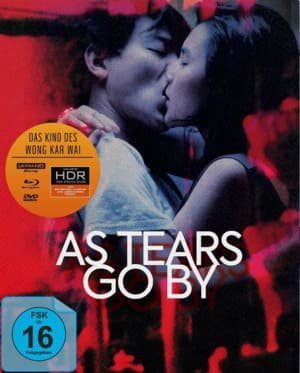A medium-sized gangster has to make a choice between love for a woman and loyalty to the ideals of male friendship. In the first case, a long happiness in the family union in the second – death as payback for valor.
4k movies reviews
Wong Kar-Wai, like any visionary, has his quirks: he draws love worlds with memories, outlines with words, and saturates the drawing with musical tonality. But the artist’s brush was not always soft and delicate, so to create museum paintings like “Love Mood” or “2046”, it was dry and rough. The artist paints like a boy seeing a watercolor for the first time, with the innocent urge to depict something right on the asphalt, to cover the muddy sidewalk with paint and randomly stroke his brush until a clear picture emerges, careless, sweeping, but childishly simple, without any embellishment. That’s how Kar-Wai’s debut film turned out, with its grim naturalism and cinematic minimalism, the story of two brothers who become entangled in crime slums and learn to survive in them. While the younger one was always getting into trouble, the older one kept bailing him out; while one sought salvation by seeking authority, the other found it with his cousin. A hopeless struggle, a strange love affair.
Like many of the director’s later pictures, his first film is also about the past. A past from which the characters look back to make decisions, from which their motives are formed and their fears of loneliness, of a lost life, sprout. Fly is afraid of justifying his identity, of remaining a worthless fly that only buzzes in his brother’s shadow, but desperately wants to get out from under his aegis and feel, at least for a few minutes, like someone who matters. Va has learned criminal fame in his time and now has found a new life with his cousin Ngo. The incestual motifs in the film are not there for their own sake, they are as part of the plot, showing that the hero does not always suffer morally, but that this is how he can express his love, abnormally and perversely, impregnating whores and falling in love with his cousin because he deserves nothing else because of his criminal personality. Ngo, however, appears as a gentle and sweet person, the opposite of Wa. Kar-wai sees in her a certain light, a chance for a new life for the hero, but he only sacrifices himself for his misguided brother. Life throws him out of his “calm” rut, forcing him into a difficult choice, almost between life and death.
The tragedy of their decaying world is felt from the first minutes. In the night atmosphere, in the daily squabbles with the local scoundrels, in the broken household objects. Hope for the best is instilled by a young girl who has taken on her frail shoulders the impossible burden of driving the oppression of the past out of her lover, which frames the present. For the first time in his life or in many years, someone cares for him: preparing breakfast, cleaning the apartment, buying glasses, but hides one, because he knows that sooner or later they will all be broken. The more attention and care, the more impossible it becomes to live. Living the old life, but now clutched in a vise, which makes the breakaway feel more painful. Kar-wai pushes to understand his characters, he likes to dig into them, but the deeper he digs, the more pain he burns out. Everyone suffers: silently, screaming – it doesn’t matter. Fly, with his psycho-emotional background disturbed, seeks fame in the underworld by any means necessary. He refuses to help his own brother because he knows he can’t repay him, but this is the only way to atone for his past, dragging his younger brother from the deadly abyss that drags them both deeper and deeper into the bloody puddles of the city slums.
But Wong Kar-wai is also a philosopher. In a mixture of melodrama and gangster cinema, with scenes of fighting and murder, peppered with epileptic camerawork for a touch of either realism or chaos, he emphasizes existential horror and exudes subjectivity, empathizing with his characters despite their essence. The point is the dialectic itself, the systematic inner development of the dilemma, the choice between a code of honor and insurmountable circumstances outside, for which the film is considered a remake of Mean Streets. The films are similar in the flip side of the criminal world and the main character’s hesitation between the two poles, but Kar-Wai, unlike Scorsese, was able to rethink this story emotionally deeper, filling it with philosophy. The personal conflict gradually transcends: the criminal, destructive community is contrasted with a certain ordinariness of simple life, fraternal friendship and pathological love, where the dichotomy of struggle rages on. A struggle internal and external, which has always been and continues long, painfully, relentlessly.
Info Blu-ray
Video
Codec: HEVC / H.265 (69.7 Mb/s)
Resolution: Native 4K (2160p)
HDR: HDR10
Aspect ratio: 1.78:1
Original aspect ratio: 1.85:1
Audio
German: LPCM 2.0
Cantonese: LPCM 2.0 Mono
Subtitles
English.

